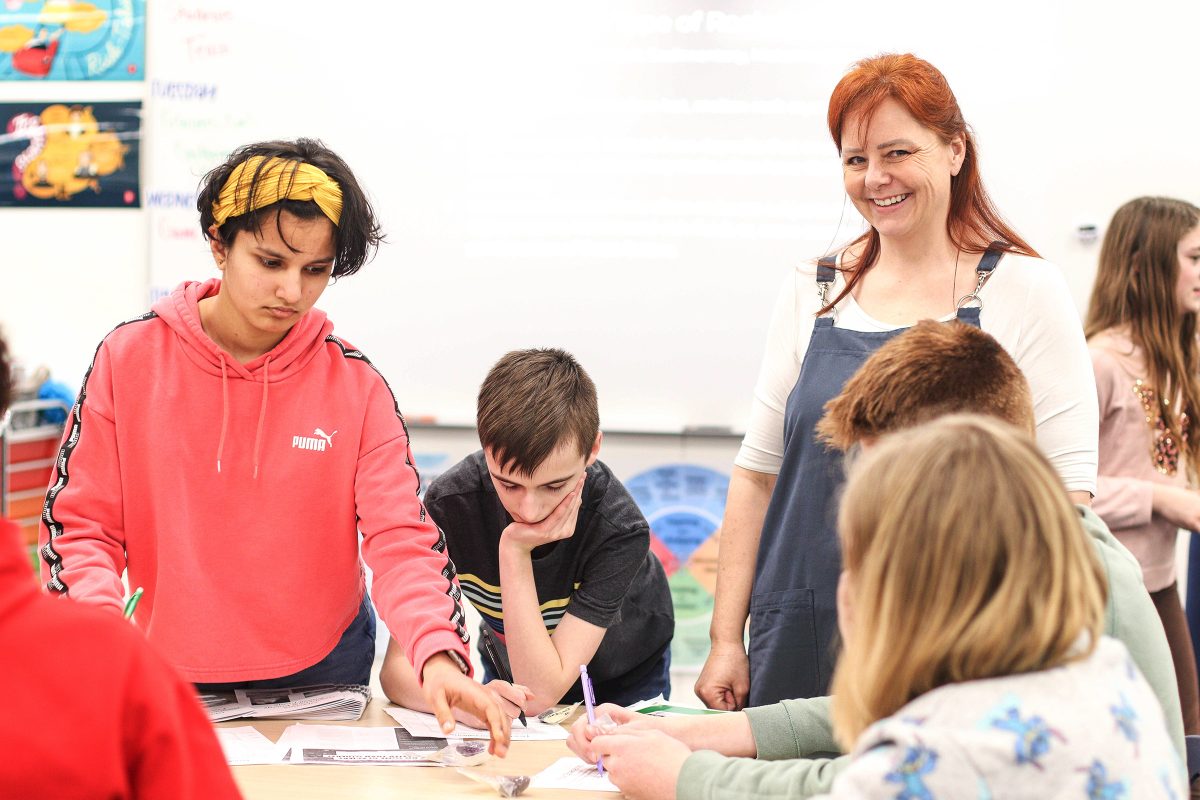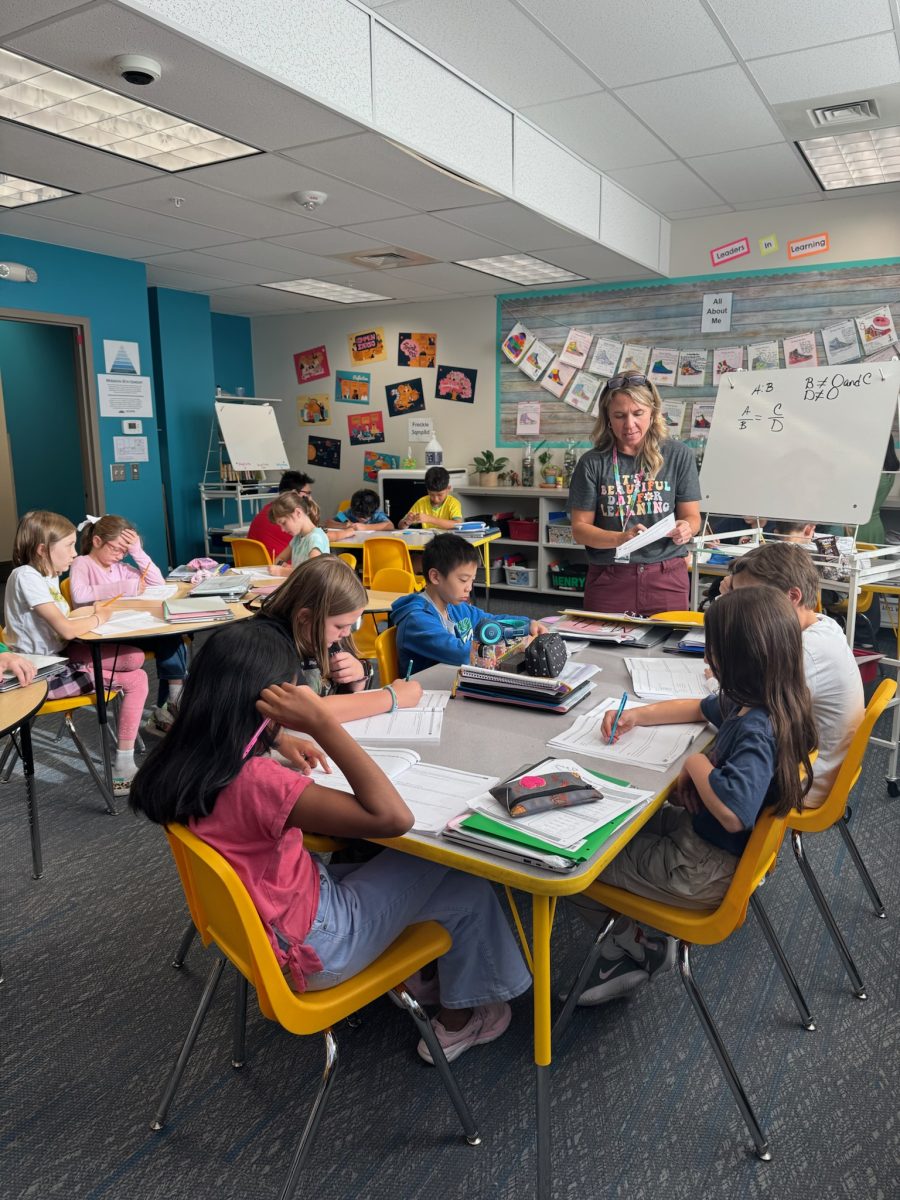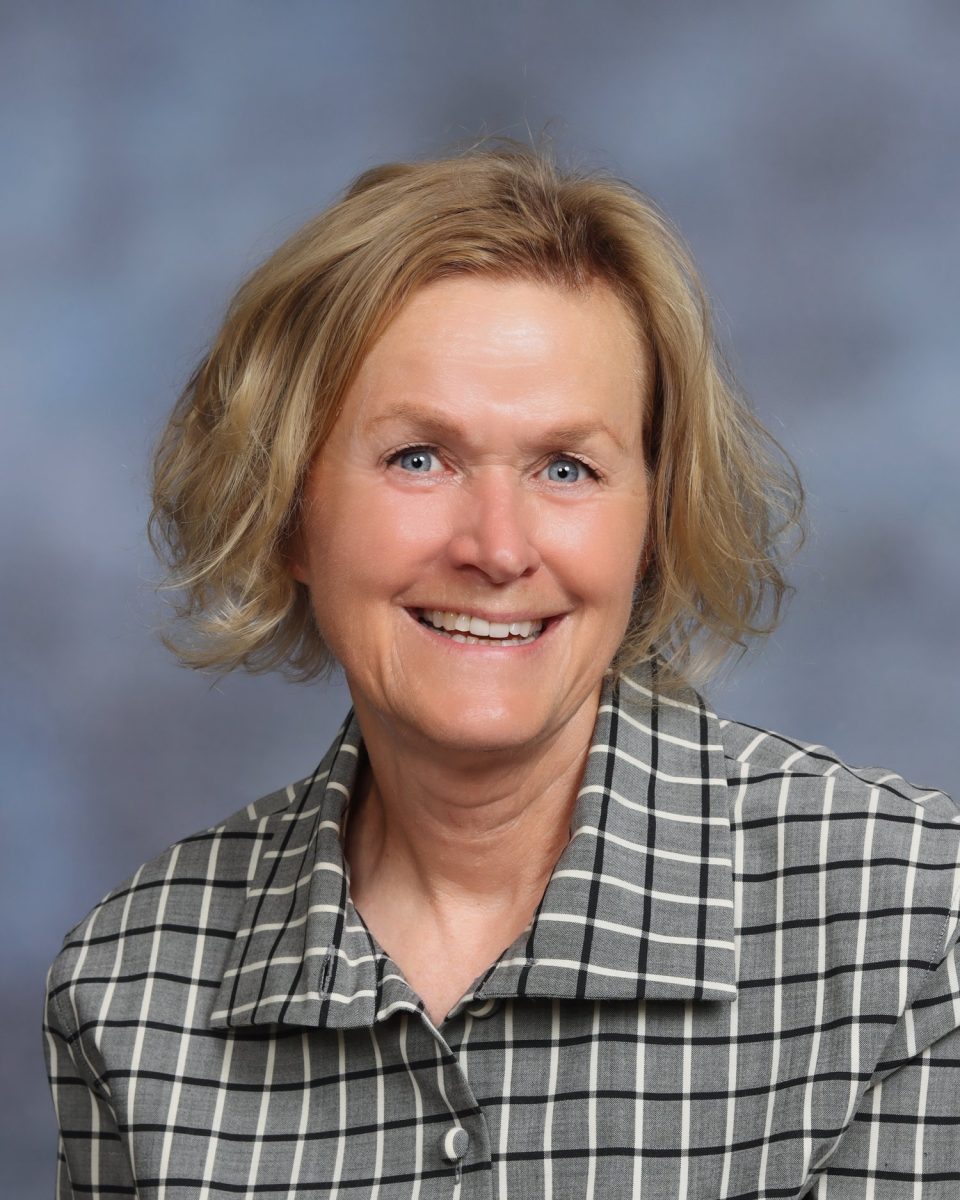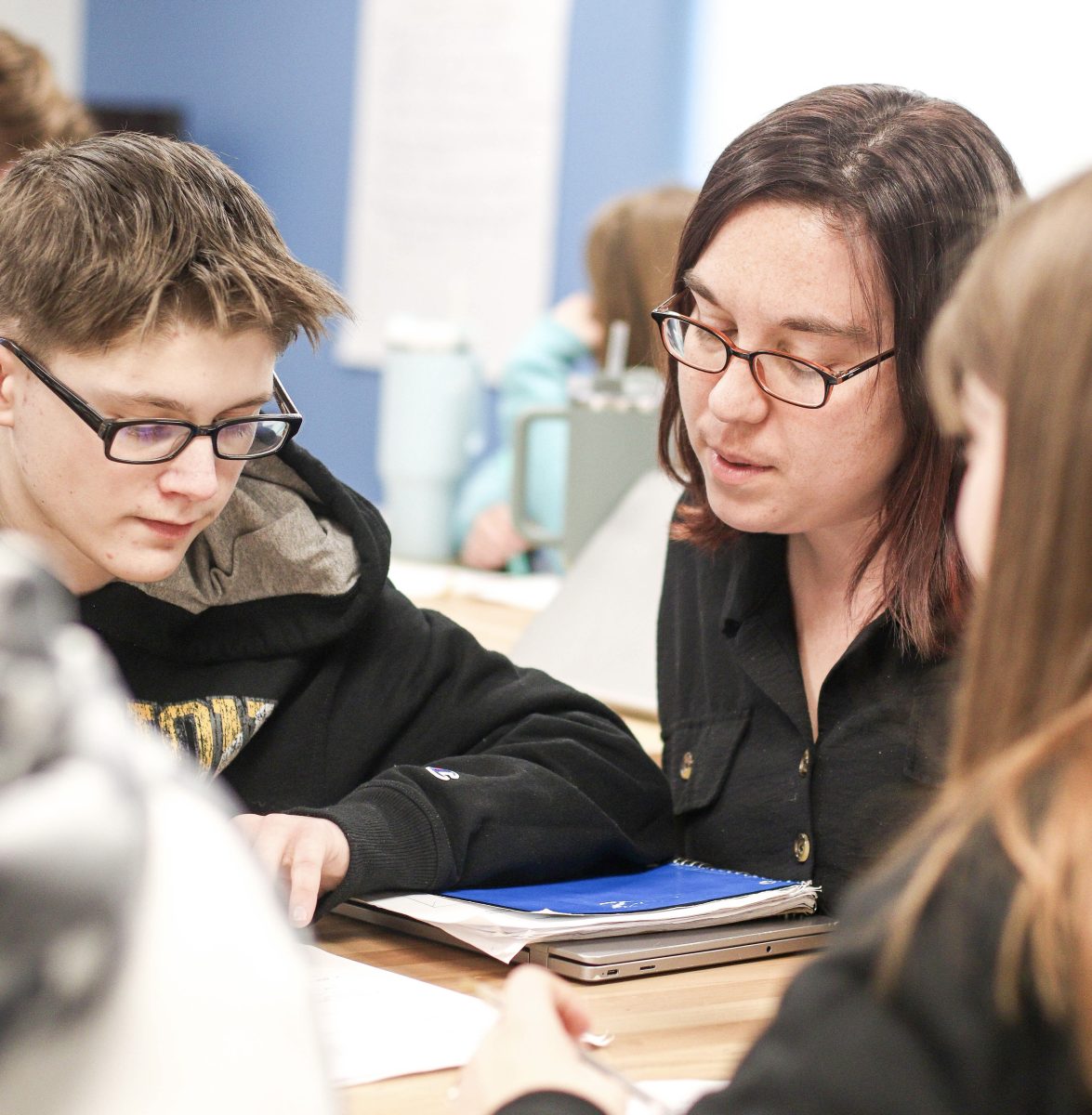The Alturas Advantage: Structure, Collaboration, and Leadership in Action Article
The Alturas Advantage: Structure, Collaboration, and Leadership in Action

At Alturas International Academies in Idaho Falls, Idaho, the sights and sounds of learning are everywhere – from how the students collaborate with each other to solve real-world problems, how peer groups mentor each other in learning, and even how their classrooms are meticulously organized. As Michelle Ball, Alturas founder and Executive Director puts it, “Great schools are built on systems, with kindness and discipline as key attributes.”
A Structured Yet Collaborative Approach to Learning
Alturas International Academy (grades K-5) and its counterpart, Alturas Preparatory Academy (grades 6-12), are International Baccalaureate (IB) schools designed to develop well-rounded individuals with inquiring minds, broad knowledge, and a robust skill set. Intended to help prepare students to thrive in an ever-changing world, IB schools like Alturas inspire students to be lifelong learners, critical thinkers, and global citizens, with flexible systems forming the foundation for classroom learning.
Beginning in Kindergarten, students are taught to follow the Alturas way: belongings and learning supplies are neatly organized and kept in the same places; every classroom follows the same daily routine; and boundaries are consistent, but positive, for every student.
These structured systems, which are inspired by Finnish school models, extend from classroom management to how the students learn. The inquiry-based lessons are creative, but always anchored in best teaching practices and research-based programs which are proven to help students learn. Every lesson includes a check for understanding to ensure that skills are being mastered, not just practiced.
“These methods create a learning environment where students are motivated to explore, to understand deeply, and achieve their full potential,” Ball explains.
There are clearly defined, high expectations for students’ work in all grades at the Academy. Assignments are followed up by constructive and informative feedback intended to foster a culture of continuing growth.
Most importantly, the student-led learning takes place in small, collaborative groups of individuals who score at a similar skill level in that subject, rather than simply grouping children by grade or age. The individual desks and rows have been replaced by tables seating four to six students. Ball reports, “Programs that are leveled by skill development focus on meeting the students where they are in their learning journey and tailoring education to their individual needs.”
In these student groups, referred to as communities, the learning and self-direction seem effortless. In reality, they are the product of a strict, daily adherence to the carefully constructed Alturas systems. The students gather their supplies, begin their tasks, and transition from subject to subject without bells or prompting.
But wipe away any dystopian imagery. Alturas Academy students are engaged, freely discussing, and excitedly sharing ideas with their peers in a focused and productive way. The tenets of the student partnerships are kindness, mutual support, collaboration, and confirmation of completed work. The learning process is evident in watching and listening to the students in the classrooms.

“Alturas creates an environment where students are engaged and focused, and enthusiastic about sharing and discussing their work. This process enhances academic learning, but also prepares students with the collaborative and communication skills essential for their future,” maintains Ball.
Systems Lead to Success
If the classroom interactions are not evidence enough of the learning and progress happening at Alturas, the test scores should be. Students at both Academy levels scored near the 90th percentile in reading in 2023. Both schools also scored well above the state average in mathematics.
Hillary Betz, Program Officer with the J.A. and Kathryn Albertson Foundation, a supporting partner of the Alturas Academies, explains, “Fidelity to the Alturas model and the systems they have developed has directly resulted in higher test scores.”
In each classroom, multiple assistant teachers – under the guidance of a veteran teacher steeped in the Alturas model – circulate from group to group facilitating the lessons which are taught at differentiated skill levels. Additionally, the teachers remain with the same group of students for two to three years, fostering a meaningful relationship with each child.
“The long-term relationship between teachers and students is a cornerstone of the Alturas model,” Ball states. “It offers significant benefits such as increased understanding, seamless progression, mentorship, continuity, and stability…ultimately leading to better outcomes for the students.”
As a Title I, IB school, students also have access to resources to support learning deficits or specialized education. These students are not pulled out of the classrooms, away from their peers, but instead receive interventions within their learning communities. In turn, the more advanced students mentor their peers, paying forward the gift of teaching and learning to each other.
Growing Leaders from Within
The idea of developing educational leadership from the ground up is at the heart of what Ball wants the school to become. Just as students take on leadership and mentoring roles within their learning communities, teachers new to the systems are mentored by experienced Alturas educators. It is the expectation that these assistant teachers will in turn become mentors, and that the mentors will eventually become school leaders and administrators. “We are working to develop our school’s future leaders from within our own community,” states Ball. “We’re constantly looking to the future.”
Brian Bingham, Alturas Co-Founder and CEO, has found that applying the same strategies and systems from the Alturas classroom to professional development and decision-making has created a cohesive and inclusive culture among the school’s leadership.
“The leadership team at Alturas is very strong and poised for growth into the future. We have a great foundation with our administration, as nearly all of them have taught in our schools and are very familiar with the school culture and expectations,” reflects Bingham.

Ball explains this evolution in thinking about leadership, “In the beginning we ran our Friday professional development like every other school – as whole group instruction. Why? Once we changed to small group instruction and created our own learning communities, everything changed. Now, all decisions are collaborative, team and community-based.”
What has been most exciting for Ball and Bingham is the fact that the grassroots development of school leaders has expanded beyond the walls of the Alturas Academies. Other Idaho charter school administrators are looking at the Alturas model as a blueprint for how to set up their own successful institutions.
Julie Koyle, a Bluum 2024 New School Fellow who is spearheading the plan to turning Hollister Elementary, Idaho’s historic but floundering primary school into a charter school, would like the learning environment of their campus to mirror that of Alturas International Academy, perhaps even becoming a satellite location to that organization. And Koyle is not alone. Other schools inspired by or directly connected to the Alturas Academies are in the works throughout eastern Idaho.
Bluum’s Director of Academic Development and District Outreach, Mike Caldwell, states, “Alturas is well regarded and has a lot of opportunities for growth in the Magic Valley and throughout the state. Wherever they open a school they will have a waitlist.”
In August of 2024, Alturas received approval for its third official charter school location in Rigby, Idaho where many students who are currently on the waitlist reside. The K-8 school plans to open in the fall of 2026.
Ball declares, “I believe the Alturas model can show Idaho educators what is possible for how kids learn and think about themselves. We are the change that is possible in Idaho.”
Two Leaders Looking for More
Ball knows what it’s like to be an outsider with passionate ideas about how to improve education, fighting the entrenched establishment of public education. She was a born teacher, growing up in Idaho Falls and teaching for over two decades at Sunnyside Elementary School in a skills-based leveled learning program she developed, with inspiration from a colleague. When her innovative practices began to conflict with those being promoted by the administrators and the local district, Ball decided to take a chance and open her own school.
Meanwhile, Bingham loved being a Spanish teacher and coach, but wanted more. “I wasn’t looking for a job, I was looking for a way to change education,” explains Bingham.
Alturas started in 2015 with only 24 students in an available space below the old courthouse in downtown Idaho Falls. Today, the elementary school has grown to serve over 500 students, and is now located in the beautifully renovated O.E. Bell building. Alturas Prep, the secondary school co-founded by Bingham, opened its doors in 2021 and now serves an additional 300-400 students.
When asked how the Alturas leadership successfully tackles this rapid growth, Bingham replies, “What has helped us is the network of other school leaders who are in the charter sector as well. They’ve been a great resource.”
Bingham adds, “we have had a great start, but we expect to have an even better and brighter future because of our administrative team and faculty who support our vision and mission.”
Recent Stories
Read When Idaho’s Kids Need Help, Collaboration Makes Change Possible
When Idaho’s Kids Need Help, Collaboration Makes Change Possible
Most Idaho families struggle to find behavioral healthcare. Providers are scarce, waitlists are long, and the number of young people experiencing trauma, depression, and anxiety is rising. Idaho is widely known as a mental healthcare desert.
Read Project Inclusive at Pavlis Park: Southwest Idaho’s First Adaptive Mountain Bike Trail System
Project Inclusive at Pavlis Park: Southwest Idaho’s First Adaptive Mountain Bike Trail System
In the expansive foothills of Eagle amid the Avimor housing development, a quiet revolution in outdoor access began unfolding last spring. Led by the Southwest Idaho Mountain Biking Association (SWIMBA), Project Inclusive broke ground on the area’s first adaptive mountain bike trail system, named in honor of Kevin A. Pavlis, a coach and champion for adaptive athletes.
Read FORGED Together: How the Idaho Outdoor Fieldhouse Builds More Than Muscle
FORGED Together: How the Idaho Outdoor Fieldhouse Builds More Than Muscle
“This is about so much more than just being strong in the gym,” says Anna Woodring, Director of Human Performance at the Idaho Outdoor Fieldhouse. “It’s about building community, developing new skills, and then continuing on afterward with these habits - and even friendships - that have been built.”
Read In the Classroom and Beyond: How Sage International School Nurtures Global Citizens
In the Classroom and Beyond: How Sage International School Nurtures Global Citizens
From humble beginnings holding classes with a handful of students in a local park, to serving over 1,000 students on their campus on Parkcenter Blvd in the heart of Boise, Sage International School has crafted a rare learning opportunity in Idaho, one that is replicated in only a handful of other schools in the world.



